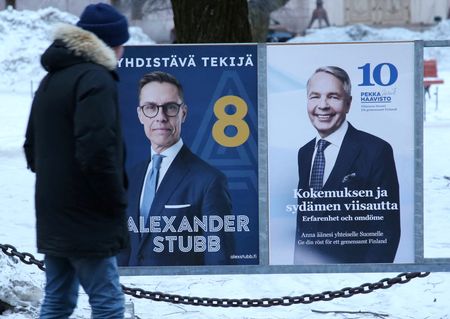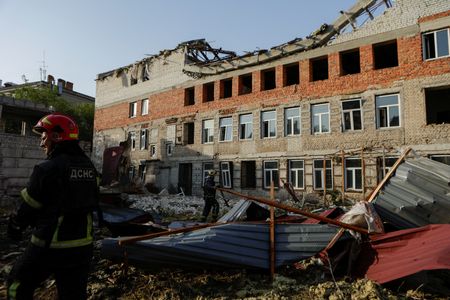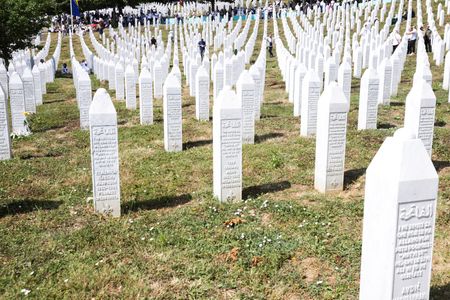By Anne Kauranen and Essi Lehto
HELSINKI (Reuters) -Alexander Stubb of the centre-right National Coalition Party narrowly won Finland’s presidential election on Sunday, defeating liberal Green Party member Pekka Haavisto, who conceded defeat.
Stubb is pro-European and a strong supporter of Ukraine who has taken a tough stance towards Russia.
He declared himself winner in the run-off vote after securing 51.6% of the votes as 99.7% of ballots had been counted, against Haavisto’s 48.4%, justice ministry data showed.
Finland new head of state will be responsible for its security and foreign policy, including the recently approved NATO member’s stance towards Russia, with which it shares a long border.
In televised remarks Stubb called his victory “the greatest honour” of his life.
“The feeling is calm, humble but of course at the same time I am extremely happy and grateful that the Finns in such large numbers have voted and that I get to serve as president of the Republic of Finland,” he said.
Stubb, a former prime minister, had won the first round on Jan.
28 with 27.2% of the vote ahead of Haavisto on 25.8%. He has also led Haavisto in opinion surveys, most recently by 6-8 percentage points.
Haavisto congratulated Stubb as “the 13th president of Finland”.
“I believe Finland now gets a good president for the republic.
Alexander Stubb is an experienced, competent person for the job. No more babble,” he said.
The vote marks a new era in Finland, which for decades has elected presidents to foster diplomacy, in particular with neighbouring Russia, and opted not to join military alliances so it could soothe tensions between Moscow and NATO.
But Finns changed their minds after Russia’s invasion of Ukraine in 2022, in a rapid U-turn that led to the country joining NATO in April last year.
Now under the Western alliance’s security umbrella, Stubb will replace Sauli Niinisto, who is retiring after two six-year terms in which he earned the nickname “the Putin Whisperer” for his previous close ties with the Russian leader.
Stubb will have a central role in defining Finland’s NATO policies, while taking the lead on overall foreign and security policy in close cooperation with the government and acting as commander-in-chief of the armed forces.
“Warm congratulations to Alexander Stubb.
Finland is our close friend and partner,” Swedish Prime Minister Ulf Kristersson said in a post on X.
NO RELATIONS WITH RUSSIA
Lauri, a 36-year-old IT worker who voted in Helsinki, named Russia as the main task the new president will face.
“Obviously we all know that we are in a difficult position nowadays looking at Russia, the entire turbulence in the world today. So I think that’s the biggest threat and biggest issue that we have,” he told Reuters on Saturday.
In an interview with Reuters last month, Stubb said there would be no Russian pillar in Finland’s foreign policy for now:
“Politically, there will be no relations with the president of Russia or with the Russian political leadership until they stop the war in Ukraine.”
Stubb is in favour of deep NATO cooperation, such as allowing the transport of nuclear weapons across Finnish soil and placing some NATO troops permanently in Finland.
He does not support storing nuclear weapons in Finland, however.
“At times, a nuclear weapon is a guarantee of peace,” Stubb said in a debate on Tuesday.
Russia has threatened Finland with retaliation in response to its NATO membership and a defence cooperation agreement signed with the U.S.
in December.
(Reporting by Anne Kauranen, Essi Lehto and Tom Little in Helsinki, Editing by Kylie MacLellan, Sharon Singleton, Hugh Lawson, Terje Solsvik and Giles Elgood)














